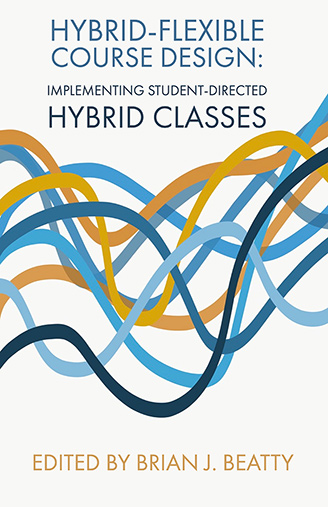How to Implement Hyflex Course Design: Book Review

Hybrid-Flexible (HyFlex) Course Design is an extremely timely and popular topic. HyFlex courses are multi-modal courses that combine online and classroom-based students. This design allows for students to have the freedom and ability to choose which mode to participate in, and therefore are able to create their own unique experience. Learning about effectively implementing HyFlex courses is particularly important in the times of COVID, as institutions are holding more HyFlex courses than ever before in order to provide students with the opportunity to receive as many in-person learning experiences as possible while implementing required social distancing protocols.
From an instructor perspective, teaching HyFlex courses can be particularly challenging! At the institution where I am currently teaching, some of the HyFlex courses include different groups of students attending in-person different days of the week (for example, students with last names A-E attending every Monday in-person, etc.). This structure requires providing students with clarity and consistency, and the need for the instructor to communicate constant reminders to students. For students who have several HyFlex courses during the same semester, remembering which class to attend on which day can prove to be challenging. The flexibility of HyFlex courses can be appealing, while also at times, overwhelming and inconsistent for both instructors and students. In addition, COVID provides added challenges for the instructor in a HyFlex classroom, including the requirements of implementing seating charts and disinfecting protocols. Active learning strategies in a physically distanced classroom also require different preparation and implementation. Overall, HyFlex courses can be daunting, while also allowing for the opportunity for added flexibility for students. HyFlex courses have become more prevalent during COVID and will continue to be implemented throughout higher education institutions. As instructors, it is important to learn best practices related to HyFlex teaching.
 A free e-book has been published on HyFlex. The e-book is titled: Hybrid-Flexible Course Design: Implementing Student-Directed Hybrid Classes. The editor of this e-book is Brian J. Beatty, an Associate Professor of Instructional Technologies in the Department of Equity, Leadership Studies and Instructional Technologies at San Francisco State University.
A free e-book has been published on HyFlex. The e-book is titled: Hybrid-Flexible Course Design: Implementing Student-Directed Hybrid Classes. The editor of this e-book is Brian J. Beatty, an Associate Professor of Instructional Technologies in the Department of Equity, Leadership Studies and Instructional Technologies at San Francisco State University.
The focus of this e-book is to provide readers with strategies, methods, and case studies related to HyFlex course design so that instructors can make informed decisions related to the potential usefulness of HyFlex courses to serve the needs of their students. The e-book is divided into three units, described in more details below.
Unit I: Hybrid-Flexible Course Design to Support Student-Directed Learning Paths
Unit I focuses on providing rationale for offering HyFlex courses. Specific chapters in this unit provide insight into the background of the development of the HyFlex design, discuss many of the common costs and benefits of implementing a HyFlex design, explain the fundamental values and principles guiding the HyFlex design, and describe a simplified instructional design approach adapted for HyFlex course design.
Unit II: Implementation and Adoption of Hybrid-Flexible Instruction
Unit II provides detailed explanations related to specifics for building and implementing HyFlex courses, focusing on the experiences of faculty, students, administration, and institutions. Chapters in this unit describe the experience of instructors who have implemented a HyFlex course design, specifically focusing on the challenges and successes they have experienced. Additional chapters include insight from common student experiences, explanations from administrative factors (scheduling, workload management, logistics, etc.) and other insights related to institutional approaches to HyFlex course design.
Unit III: Hybrid-Flexible Implementations Around the World
Unit III provides specific case reports from institutions and faculty who have implemented HyFlex courses. This Unit includes insight from the unique context of each HyFlex course design and implementation. Specifically, each report incorporates information from the design and implementation experiences and impact evaluations (when available). Case reports include experiences from faculty at Northern Ontario, Montana State University Billings, KU Leuven, Peirce College, Delgado Community College, and the University of St. Thomas. The case reports incorporate experiences of online certificate courses, undergraduate courses, and graduate courses.
The e-book concludes with a call for submitting your own case report if you have been able to design and implement a HyFlex course at your institution! If you are interested in submitting a case report, please email [email protected] with your interest.
Additional resources available through the e-book include a bibliography of over 50 articles and presentations addressing HyFlex course design approaches. The e-book can be accessed here: https://edtechbooks.org/hyflex
About
 Allie Alayan has an undergraduate degree in psychology from Indiana Wesleyan University and a masters in clinical psychology from Wheaton College. Allie is currently a PhD student at Colorado State University and an instructor of two large-enrollment General Psychology courses. Allie’s research interests include topics relevant to the scholarship of teaching and learning.
Allie Alayan has an undergraduate degree in psychology from Indiana Wesleyan University and a masters in clinical psychology from Wheaton College. Allie is currently a PhD student at Colorado State University and an instructor of two large-enrollment General Psychology courses. Allie’s research interests include topics relevant to the scholarship of teaching and learning. 
Brian Beatty
May 21, 2021 at 10:40 am
Allie, thak you for your thorough review. The book has been a help to many thousands of educators around the world over the past year and a half. Who could have imagined that the need for help shifting all of our educational system fully or partially online would happen almost overnght? I believe books like this are most useful and impactful when pubclished with free online access – when possible – and I’m thankful for publishing sites like EdTechBooks for making this available to our community. We just launched an online community support site, the HyFlex Learning Community (https://hyflexlearning.org) to support ongoing dicussions and information sharing about teaching with hyFlex or other Hybrid-Flexible approaches. Also open to everyone at no cost other than your time 🙂